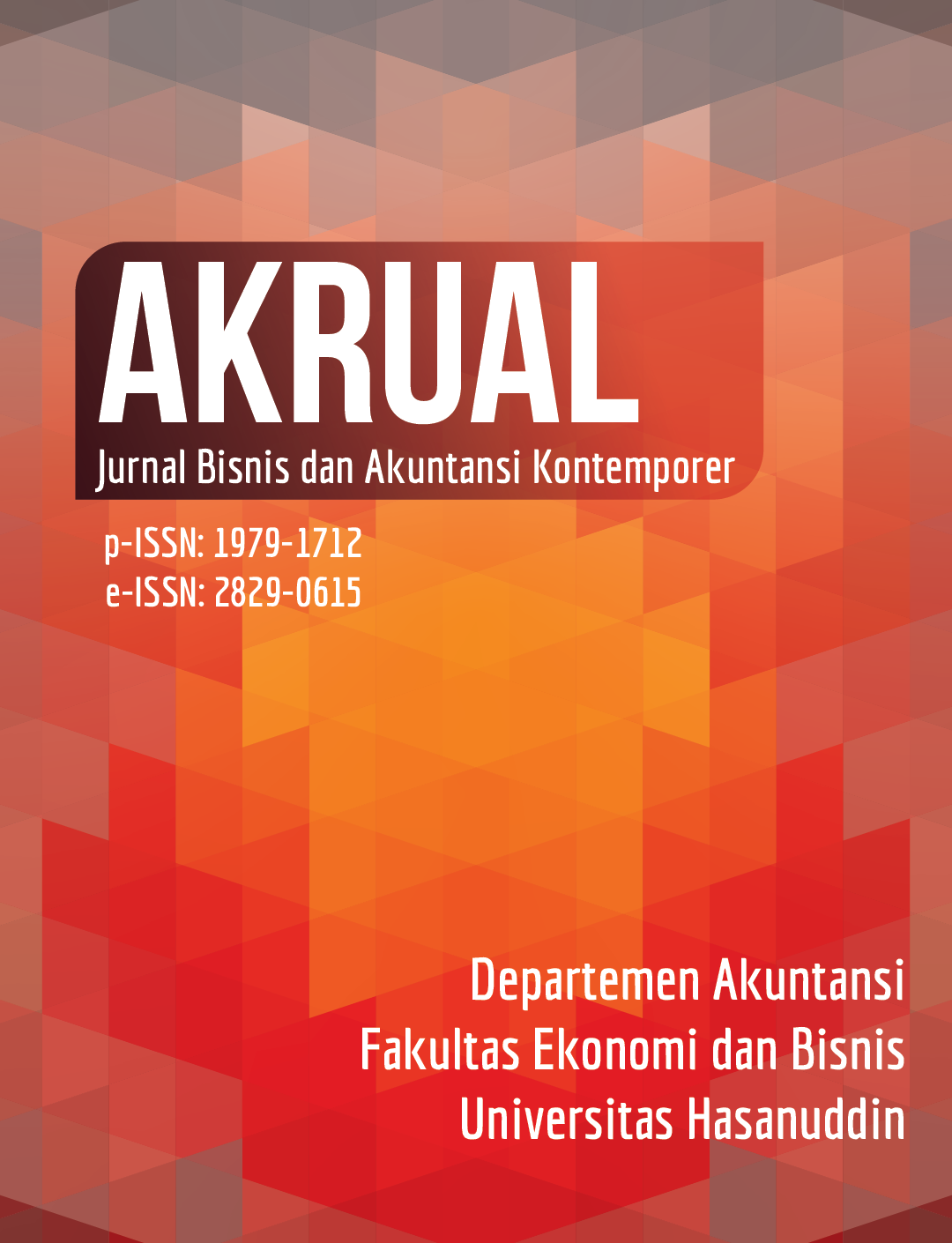Telaah Kritis Konsep Keagenan dalam Tinjauan Perspektif Islam Emansipatoris
DOI:
https://doi.org/10.26487/akrual.v17i01.28280Keywords:
Teori Agensi, Teori Agensi Islam, Konflik Keagenan, EmansipatorisAbstract
This research critically examines the agency theory through an Islamic lens. It adopts literature review approach, citing relevant and significant sources. The objective is to establish a conceptual framework for understanding agency conflicts. The findings indicate a fundamental divergence between Islamic principles and conventional agency concepts. Drawing on an emancipatory Islamic perspective, the research introduces the concept of Islamic agency, which upholds ethical considerations while acknowledging the prevailing social system. This study contributes to the ongoing discourse on agency theory by offering an alternative perspective rooted in Islamic principles and values. Further research is encouraged to explore the practical implications and potential applications of Islamic agency within organizational contexts.Downloads
References
Agustin, H., Rahman, F.A. dan Jamil, P.C. 2020. A Critical Islamic Perspective Towards Agency Theory. International Journal of Economics, Business and Management Research, 4(8): 43-50.
Aglietta dan Rebérioux. 2005. Corporate Governance Adrift A Critique Of Share-holder Value. United Kingdom: Edward Elgar Publishing Limited.
Alam, N., Ramachandran, J., dan Nahomy, A.H. 2020. The Impact of Corporate Governance and Agency Effect on Earnings Management – A Test of the Dual Banking System. Research in International Business and Finance, 54(C): 1-33.
Alimuddin. 2013. Memahami Hakikat Hidup: Menggapai Kehidupan Mashlahah melalui penerapan Nilai-Nilai Islam Dalam Islam. Jurnal ASSETS, 3(1): 1-28.
Anggareni, Mariska Dewi. 2011. Agency Theory dalam Perspektif Islam. Jurnal Hukum Islam, 9(2): 272-288.
Beekun dan Badawi. 2005. Balancing Ethical Responsibility among Multiple Organizational Stakeholders: The Islamic Perspective. Journal of Business Ethics, 60(1): 131–145.
Belkaoui-Riahi, Ahmed. 2000. Teori Akuntansi. Terjemahan oleh Marwata, Harjanti Widiastuti, Alia Ariesanti, Ch. Heni Kurniawan. Jakarta: Salemba Empat.
Budiyanti, N., Aziz A.A., Suhartini A., Ahmad, N. dan Prayoga, A. 2020. Konsep Manusia Ideal: Tinjauan Teologis dan Pendidikan Islam. Jurnal Pendidikan Islam, 5(2): 43-67.
Ceyhan, S. dan Barca, M. 2021. Agency Perspective in Islamic Political Treatises: Implications for Contemporary Management Research. International Journal of Emerging Markets.
Chawstiak, Michele. 1999. Deconstructing The Principal-Agent Model: A View From The Bottom. Critical Perspectives on Accounting, 10(4): 425-441.
Chua WF. 1986. Radical Developments in Accounting Thought. Accounting Review, 6 (4): 601–632.
Dahlan, Moh. 2012. Nalar Ilmu Kalam Emansipatoris. Religi, 8(1): 49-62.
Eisenhardt, Kathleen M. 1989. Agency Theory: An Assessment and Review. Academy of Management Review, 14(1): 57-74.
Hameed, M.I. 2000, ‘Nurtured by “Kufr”: The Western philosophical assumptions underlying conventional (Anglo-Amercian) Accounting’, International Journal of Islamic Financial Service, 2(2):1-31
Heath, Joseph. 2019. The Uses and Abuses of Agency Theory. Business Ethics Quarterly, 19(4): 497-528.
Htay dan Salman. 2013. Agency Theory, Stewardship Theory and Stakeholder Theory: An Islamic Perspective. International Journal of Physical and Social Sciences, 3(9): 319-332
Kamla, Rania, Gallhofer, Sonja dan Haslam, Jim. 2006. Islam, nature and accounting: Islamic principles and the notion of accounting for the environment. Accounting Forum, 30(1): 245–265.
Khalid dan Sarea. 2020. Independence and effectiveness in internal Shariah audit with insights drawn from Islamic agency theory. International Journal of Law and Management, 63(3): 332-346.
Kumalasari dan Made Sudarma. 2013. A Critical Perspective Towards Agency Theory. Jurnal Akuntansi Multiparadigma JAMAL, 4(2): 165-329.
Noreen, E. 1988. The Economics of Ethics: A New Perspective on Agency Theory. Accounting, Organisations and Society, 13(4): 359-369.
Panda dan Leepsa. 2017. Review Agency theory: Review of Theory and Evidence on Problems and Perspectives. Indian Journal of Corporate Governance Institute of Public Enterprise SAGE Publications, 10(1): 74-95
Ruslan, Muhammad. 2013. Konsepsi Ideologis Akuntansi Islam Dalam Tinjauan Paradigma Teologi Pembebasan. Skripsi. Makassar: Program Sarjana Fakultas Ekonomi Universitas Hasanuddin.
Sakti, M. R. P., Tareq, M. A., dan Kamiyama, H. 2021. Corporate Governance from an Islamic Moral Economy Perspective: The Dimensions and Analysis. Signifikan: Jurnal Ilmu Ekonomi, 10(2): 359-378.
Shamsuddin, Z. dan Ismail A. G. 2013. Agency Theory in Explaining Islamic Financial Contracts. Middle-East Journal of Scientific Research, 15(4): 530-545.
Suyitno. 2018. Metode Penelitian Kualitatif: Konsep, Prinsip dan Operasionalnya. Tulungagung: Akademia Pustaka
Tiby dan Grais. 2015. Islamic Finance and Economic Development Risk Management, Regulation, and Corporate Governance. New Jersey: John Wiley & Sons, Inc.
Ul-Haq, Shoaib, Lone, R. A., dan Ashraf, Naeem. 2020. A Theory of Capitalist Co-optation of Radical Alternatives: The Case of Islamic Banking Industry. Organization, 29(1): 129–154.
Verdiansyah, Very. 2004. Islam Emansipatoris Menafsir Agama Untuk Praksis Pembebasan. Jakarta:P3M.
Wagenhofer, Alfred. 2015. Agency Theory: Usefulness and Implications for Financial Accounting dalam Stewart Jones The Routledge Companion to Financial Accounting Theory. London: Routledge.
Zainuldin, M.H., Lui, T.K., dan Yii, K.J. 2018. Principal-Agent Relationship Issues in Islamic Banks: A View of Islamic Ethical System. International Journal of Islamic and Middle Eastern Finance and Management, 11(22): 97-311.
Zed, Mestika. 2017. Metode Penelitian Kepustakaan. Jakarta: Yayasan Pustaka Obor.
Zogning, Félix. 2017. Agency Theory: A Critical Review. European Journal of Business and Management, 9(2): 1-8
Downloads
Published
How to Cite
Issue
Section
License
Copyright (c) 2024 Akrual: Jurnal Bisnis dan Akuntansi Kontemporer

This work is licensed under a Creative Commons Attribution 4.0 International License.









